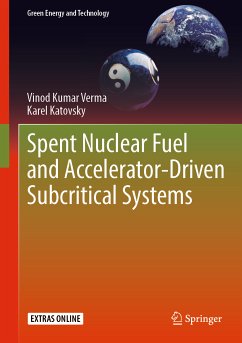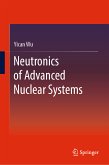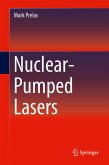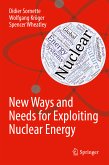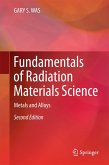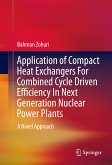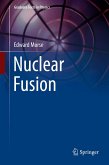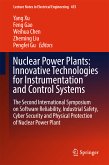Vinod Kumar Verma, Karel Katovsky
Spent Nuclear Fuel and Accelerator-Driven Subcritical Systems (eBook, PDF)
96,95 €
96,95 €
inkl. MwSt.
Sofort per Download lieferbar

48 °P sammeln
96,95 €
Als Download kaufen

96,95 €
inkl. MwSt.
Sofort per Download lieferbar

48 °P sammeln
Jetzt verschenken
Alle Infos zum eBook verschenken
96,95 €
inkl. MwSt.
Sofort per Download lieferbar
Alle Infos zum eBook verschenken

48 °P sammeln
Vinod Kumar Verma, Karel Katovsky
Spent Nuclear Fuel and Accelerator-Driven Subcritical Systems (eBook, PDF)
- Format: PDF
- Merkliste
- Auf die Merkliste
- Bewerten Bewerten
- Teilen
- Produkt teilen
- Produkterinnerung
- Produkterinnerung

Bitte loggen Sie sich zunächst in Ihr Kundenkonto ein oder registrieren Sie sich bei
bücher.de, um das eBook-Abo tolino select nutzen zu können.
Hier können Sie sich einloggen
Hier können Sie sich einloggen
Sie sind bereits eingeloggt. Klicken Sie auf 2. tolino select Abo, um fortzufahren.

Bitte loggen Sie sich zunächst in Ihr Kundenkonto ein oder registrieren Sie sich bei bücher.de, um das eBook-Abo tolino select nutzen zu können.
- Geräte: PC
- ohne Kopierschutz
- eBook Hilfe
- Größe: 6.28MB
Andere Kunden interessierten sich auch für
![Neutronics of Advanced Nuclear Systems (eBook, PDF) Neutronics of Advanced Nuclear Systems (eBook, PDF)]() Yican WuNeutronics of Advanced Nuclear Systems (eBook, PDF)120,95 €
Yican WuNeutronics of Advanced Nuclear Systems (eBook, PDF)120,95 €![Nuclear-Pumped Lasers (eBook, PDF) Nuclear-Pumped Lasers (eBook, PDF)]() Mark PrelasNuclear-Pumped Lasers (eBook, PDF)88,95 €
Mark PrelasNuclear-Pumped Lasers (eBook, PDF)88,95 €![New Ways and Needs for Exploiting Nuclear Energy (eBook, PDF) New Ways and Needs for Exploiting Nuclear Energy (eBook, PDF)]() Didier SornetteNew Ways and Needs for Exploiting Nuclear Energy (eBook, PDF)46,95 €
Didier SornetteNew Ways and Needs for Exploiting Nuclear Energy (eBook, PDF)46,95 €![Fundamentals of Radiation Materials Science (eBook, PDF) Fundamentals of Radiation Materials Science (eBook, PDF)]() Gary S. WasFundamentals of Radiation Materials Science (eBook, PDF)64,95 €
Gary S. WasFundamentals of Radiation Materials Science (eBook, PDF)64,95 €![Application of Compact Heat Exchangers For Combined Cycle Driven Efficiency In Next Generation Nuclear Power Plants (eBook, PDF) Application of Compact Heat Exchangers For Combined Cycle Driven Efficiency In Next Generation Nuclear Power Plants (eBook, PDF)]() Bahman ZohuriApplication of Compact Heat Exchangers For Combined Cycle Driven Efficiency In Next Generation Nuclear Power Plants (eBook, PDF)72,95 €
Bahman ZohuriApplication of Compact Heat Exchangers For Combined Cycle Driven Efficiency In Next Generation Nuclear Power Plants (eBook, PDF)72,95 €![Nuclear Fusion (eBook, PDF) Nuclear Fusion (eBook, PDF)]() Edward MorseNuclear Fusion (eBook, PDF)48,95 €
Edward MorseNuclear Fusion (eBook, PDF)48,95 €![Nuclear Power Plants: Innovative Technologies for Instrumentation and Control Systems (eBook, PDF) Nuclear Power Plants: Innovative Technologies for Instrumentation and Control Systems (eBook, PDF)]() Nuclear Power Plants: Innovative Technologies for Instrumentation and Control Systems (eBook, PDF)160,95 €
Nuclear Power Plants: Innovative Technologies for Instrumentation and Control Systems (eBook, PDF)160,95 €-
-
-
Produktdetails
- Verlag: Springer Nature Singapore
- Seitenzahl: 144
- Erscheinungstermin: 12. Oktober 2018
- Englisch
- ISBN-13: 9789811075032
- Artikelnr.: 56792116
Dieser Download kann aus rechtlichen Gründen nur mit Rechnungsadresse in A, B, BG, CY, CZ, D, DK, EW, E, FIN, F, GR, HR, H, IRL, I, LT, L, LR, M, NL, PL, P, R, S, SLO, SK ausgeliefert werden.
- Herstellerkennzeichnung Die Herstellerinformationen sind derzeit nicht verfügbar.
Dr Vinod Kumar Verma was a Professor of Physics at the University of Rajasthan, Jaipur (India) until April 2010 and a Professor of Engineering Physics/Nano Science at GGSIP University, New Delhi until January 2016. In a research career spanning more than 40 years he participated in international collaborations like EMU01, L3, WA93, WA98, GAMMA-2 & 3, E+T & QUINTA at the JINR, Dubna. He has authored or co-authored over 180 research papers and edited the proceedings of the Workshop on Physics of Accelerator Driven Sub-critical Systems (ADSS). In India, he is best known for his pioneering research on 'spallation neutrons' in the course of several S&T projects completed for the DST and DAE (Government of India). He has also successfully completed developmental work on two Monte Carlo Codes for the ADSS technology, i.e. the CASCADE 2004 version in collaboration with the JINR (Dubna) and the JA-IPU code for radiation damage with a team of Indian researchers. Over the past 20 years, he has initiated scientific collaborations with teams in the Czech Republic, S. Korea and Russia on the activity related to ADSS technique.
Dr. Karel Katovský graduated with a degree in nuclear engineering. His PhD thesis at the Faculty of Nuclear Sciences and Physical Engineering of the Czech Technical University in Prague (2008) was on experimental research and the nuclear data problems of ADSS. He subsequently spent several years at the Joint Institute for Nuclear Research (JINR) in Dubna. He worked at the Computation Reactor Physics Department of SKODA JS, where he dealt with nuclear fuel loading patterns and their optimization. Since 2012 he has been working as an Assistant Professor of Nuclear Engineering at Brno University of Technology, where he serves as a leader of the Nuclear Power Group to teach nuclear energy. He is the author or co-author of 37 SCOPUS-indexed papers, more than 50 conference papers, and about 30 research reports. He is a member of the Board of the Czech Nuclear Society and of the expert committee for nuclear energy of regional NGO associations in the NPP Dukovany area.
Dr. Karel Katovský graduated with a degree in nuclear engineering. His PhD thesis at the Faculty of Nuclear Sciences and Physical Engineering of the Czech Technical University in Prague (2008) was on experimental research and the nuclear data problems of ADSS. He subsequently spent several years at the Joint Institute for Nuclear Research (JINR) in Dubna. He worked at the Computation Reactor Physics Department of SKODA JS, where he dealt with nuclear fuel loading patterns and their optimization. Since 2012 he has been working as an Assistant Professor of Nuclear Engineering at Brno University of Technology, where he serves as a leader of the Nuclear Power Group to teach nuclear energy. He is the author or co-author of 37 SCOPUS-indexed papers, more than 50 conference papers, and about 30 research reports. He is a member of the Board of the Czech Nuclear Society and of the expert committee for nuclear energy of regional NGO associations in the NPP Dukovany area.
Introduction.- Chapter 1: Spent nuclear fuel and alternative methods of transmutation.- Chapter 2: General idea of accelerator driven sub-critical systems.- Chapter 3: Spallation neutron source and possibility of incineration.- Chapter 4: Requirement of nuclear data.- Chapter 5: Transmutation of spent nuclear fuel and extension of fuel cycles.- Chapter 6: Spallation neutron production facilities.- Chapter 7: Major experimental facilities for A.D.S.S.- Chapter 8: Software tools of design and modeling of A.D.S. S..- Chapter 9: Approaches, understandings, status, career opportunities and future directions.- 10. Conclusions.
Introduction.- Chapter 1: Spent nuclear fuel and alternative methods of transmutation.- Chapter 2: General idea of accelerator driven sub-critical systems.- Chapter 3: Spallation neutron source and possibility of incineration.- Chapter 4: Requirement of nuclear data.- Chapter 5: Transmutation of spent nuclear fuel and extension of fuel cycles.- Chapter 6: Spallation neutron production facilities.- Chapter 7: Major experimental facilities for A.D.S.S.- Chapter 8: Software tools of design and modeling of A.D.S. S..- Chapter 9: Approaches, understandings, status, career opportunities and future directions.- 10. Conclusions.
